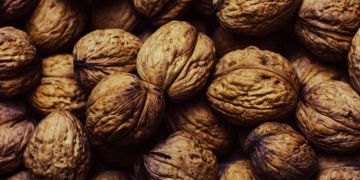Brief History
People have been cultivating and eating walnuts for roughly 9,000 years. They come from the family Juglandaceae, and their Latin name is nux Gallica. Walnuts are thought to have been widely consumed in the Gaul region of Western Europe, but they are native to India and Persia. They spread through Europe and were introduced by British settlers in North America. The variety native to North America are white and black walnuts called Juglans Nigra. The walnut tree can grow up to 35 meters high and has a life span that is many times longer than the average human.
Walnut as a Cooking Ingredient
Walnuts can be eaten on their own. They can also be prepared with main courses as well as desserts. There are salads that incorporate walnuts into their dressings instead of just toasting them and putting them on as a topping. Walnut oil is used for vinaigrettes to be eaten with greens or bread. They can be crushed and stirred into soup. They can also be chopped and sprinkled on stir-fried chicken. There are even a number of recipes for walnut bread and cakes. They are baked with fruit like apples, pears and blueberries. They are also commonly baked with pumpkin, chocolate and maple. Walnuts can be made into cereal bars and put into oatmeal.
Walnut as a Health Supplement
The best thing about walnuts is that they are one of the healthiest foods that are cultivated to be eaten. Studies promote them as a perfect dietary supplement. This is especially true because of the wide range of benefits they provide for physical health. They have preventive properties to keep fitness in check.
How To Eat
Walnuts can be eaten raw or roasted. Neither preparation will diminish their nutritive value. Today, walnut supplements are also packaged in capsules that people can buy by the bottle.
Healthiest Nut
Walnuts have an organic compound called phenol in the seed and outer covering. Scientists claim walnuts have high antioxidant levels compared to other kinds of nuts or seeds. They also have the greatest nutritional content.
Antioxidants stabilize and protect the immune system from damaged or infected cells trying to attack it. This is why eating walnuts is great a way to reduce the risk of weakening the immune system. This has become significant in research for cancer prevention and treatment.
Cardiovascular Health
The area of the body that receives the most help from walnuts is the heart and the rest of the circulatory system. They lower the risk of blood clotting by ensuring that blood vessels are clean and clear. They also keep blood pressure steady. Studies show that the nutrients present in walnuts optimize the circulatory system into a well-balanced and efficiently functioning unit. The omega-3 in walnuts helps in this.
By keeping the circulatory system in good shape, eating walnuts makes other connected illnesses less of a risk. Walnuts can provide preventive measures against medical problems such as diabetes, polycythemia and the possibility of a stroke. Walnuts still help in improving the immune system’s efforts to strengthen itself in people with diabetes.
Weight Loss
Walnuts are also great for people who are looking for a healthy way of losing weight. Nuts in general have around 690 calories per 100 grams. It may sound like a high calorie count, but they are filling and also contain a high fibre and protein content, so snacking on nuts and seeds is a good way of stopping the hunger pangs with a densely beneficial food source, and also reducing the cravings for other much less healthy snacks.
Anti-inflammatory
Walnuts are also thought to have anti-inflammatory effects. They help reduce inflammation in the body and on the surface of the skin.
Other Uses of the Walnut Tree
Other than eating the walnut, the tree’s bark and leaves also have uses of their own. When boiled and strained into a drink, the bark and leaves can be made into a laxative. This boiled mixture is also good for cleansing the liver, and can be a remedy for ulcers if used in careful doses.
Externally, walnut bark can be used for treating problems with the skin because of its antiseptic uses. It is helpful in fighting off possible infections.





